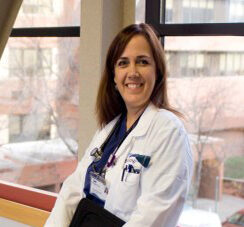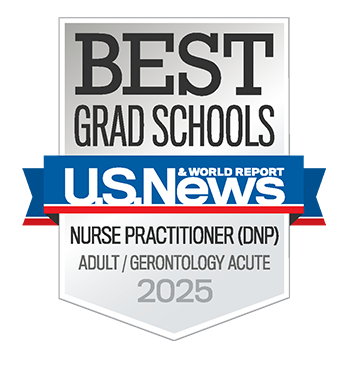DNP: Adult-Gerontological Acute Care Nurse Practitioner
Need your questions answered?
OVERVIEW
Build a Foundation
Discover a rich academic and clinical environment that facilitates the diagnosis and management of acute and chronic health problems in adult and elder patients. World renowned faculty develop a curriculum and sequence of clinical experiences which will allow you will build your abilities in physical and psychosocial assessment, clinical decision-making, health promotion and disease prevention, ordering and interpreting diagnostic tests, prescribing medications and other therapies while taking advantage of resources found only at the Hopkins medical institutions.
Students are eligible to apply for American Nurses Credentialing Center (ANCC) or American Association of Critical Care Nurses (AACN) certification as an Adult-Gerontological Acute Care Nurse Practitioner.
In addition to advanced clinical training, the DNP provides the expertise needed to develop, evaluate, advocate, and transform health care through leadership, innovation, and evidence-based improvements at the organizational and systems levels. DNP graduates remain in practice, leading cross-professional teams to advance informed, high-quality healthcare.
The knowledge, skills, and abilities to lead such change are developed across the program and demonstrated through scholarly work that addresses meaningful healthcare improvement. This includes the DNP Project Scholarly work, which establishes each graduate as a Hopkins Nursing clinical scholar
Program Details
Tuition & Fees
Estimated Tuition Cost: $2,057 per credit See Cost of Attendance Details
Financial Aid: There are numerous options for financing your education including grants, scholarships, federal loans, and employment programs. Learn more.
Upcoming Application Deadlines
Fall entry: Nov 1 and Jan 15
Requirements
Admission Criteria
Bachelor of Science in Nursing Degree or an entry-level nursing master’s degree from an ACEN or CCNE accredited college or university or an equivalent degree from a comparable foreign institution
Scholastic GPA of at least 3.0 on a 4.0 scale
Applicants must submit evidence of current nursing license. Online students must have or obtain RN license from an authorized state.
One year of full-time RN experience engaged in the direct care of adults and older adults who are physiologically unstable, technologically dependent, and require frequent monitoring and intervention within an inpatient, acute care setting (intensive or critical care, intermediate care, progressive care, stepdown or telemetry unit) by the start of the program.
Three letters of recommendation (both academic and professional references; check FAQs for detailed guidance on completing this requirement)
Official Transcripts (from all previous colleges/universities)
Current Resume /CV (check FAQs for detailed guidance on completing this requirement)
Goal statement
GRE scores are accepted but not required
Interview with faculty (if moved forward by admissions committee)
Prerequisites
Undergraduate Statistics* Take at Hopkins Nursing. Course must be completed at a regionally accredited college or university with a letter grade of B or better. Grade of B- will not be accepted.
Maryland RN licensure (or licensure from a compact state) is required prior to the start of the term when students begin clinical coursework.
* Topics should include correlation and linear regression; experimental design such as t-tests, analysis of variance and chi-square; suggested departments: psychology, sociology, education, biology, and mathematics. Statistics courses offered by business, management, and economics departments are typically more theory-based and lack the experimental design component.
Student Sponsorship
This program does not qualify for F-1 or J-1 student sponsorship. Legal Permanent Residents and non-immigrants who are otherwise physically present in the U.S. and in a status that allows for full or part-time study, may pursue this program.
DNP Advanced Practice profile based on Fall 23 cohort
* The profile encompasses all DNP NP tracks.
32%
Underrepresented Minority

91% Female/9% Male
29%
First Generation
16
Countries Represented
32
States Represented
30
Average Age
3
Average Years Nursing Experience
Curriculum
This program is offered in the online with course immersions format. The program may be completed in 70 credits and provides 840 clinical hours and 160 project practicum hours. Beginning Fall 2024, new students are required to be local (MD,DC) for clinicals by semester 3.
Plan of Study
For Current Students Admitted Fall 2023 and prior, please reference your Plan of Study.
3 Year Plan
* Indicates a semester with a required onsite immersion.
Advanced Physiology/Pathophysiology Part I (2)
Pharmacology for Advanced Practice Part I (2)
Health Promotion and Disease Across the Lifespan (2)
Application of Biostatistical Methods for Evidence-Based Practice (2)
Advanced Health Policy (2)
Advanced Physiology/Pathophysiology Part II (2)
Pharmacology for Advanced Practice Part II (2)
Diagnostics and Procedures (1)
- Advanced Health Assessment and Measurement for Advanced Practice Nurses (3) *
- Application of the Research Process to Evidence-Based Practice (2)
- Introduction to Acute Care Fundamentals (4)
Introduction to Acute Care Clinical Management (1, 80cl)
Advanced Practice in Acute Care I Diagnostic Reasoning (3.5)
Advanced Practice in Acute Care I Clinical Management (2, 160cl)
Healthcare Finance for Advanced Nursing Practice (2)
- Organization and Systems Leadership for Quality Healthcare (2)
- Advanced Practice in Acute Care II Diagnostic Reasoning (2)
Advanced Practice in Acute Care II Clinical Management (2.5, 200cl) *
Scholarly Problem Discovery and Foundations of Nursing Leadership in Healthcare (2.5)
Scholarly Problem Discovery and Foundations of Nursing Leadership in Healthcare Practicum (0.5, 40hrs)
- Inquiry for Scholarly Practice (3)
Evidence-Based Practice and Research Translation in Healthcare (2.5)
Evidence-Based Practice and Research Translation in Healthcare Practicum (0.5, 40hrs)
Translation of Evidence for Advanced Nursing Practice (1)
- Advanced Clinical Data Management for Evidence-Based Practice and Performance Improvement (2)
Advanced Practice in Acute Care III Diagnostic Reasoning (3)
Advanced Practice in Acute Care III Clinical Management (2.5, 200cl)
Health Policy, Advocacy, and Legislation Transformation in Healthcare (1.5)
- Health Policy, Advocacy, and Legislation Transformation in Healthcare Practicum (0.5, 40hrs)
- Advanced Applications of Information Technology in Healthcare Delivery (2)
Advanced Practice in Acute Care IV Diagnostic Reasoning (3)
- Advanced Practice in Acute Care IV (2.5, 200cl) *
Clinical Data Management (2)
Quality, Safety, and Systems Improvement and Dissemination in Healthcare (1.5)
- Quality, Safety, and Systems Improvement and Dissemination in Healthcare Practicum (0.5, 40hr)
Curriculum, credit hours, and sequencing are subject to change.
** Transfer Credits from the JHSON MSN (Entry into Nursing) Program to the DNP Advanced Practice Track can vary based on current curriculum & start date.
***A minimum of 1000 practice hours is required for DNP.
****Transfer of credit is granted on an individual basis. Please see the transfer of credit policy and complete the form to make a request.
“I feel a responsibility to be a nurse leader.” Lynn Gordy
Lynn Gordy
Engage with Us
Join us soon for a tour, on-campus event or a virtual visit.
Request Information
Speak with Admissions to learn more about our programs.
Virtual Info Sessions
See recordings of some of our recent virtual info sessons.
Tuition & Other Costs
Financial aid
View the costs for the DNP Advanced Practice Program.
Scholarships & Grants: Grants are awards based on financial need that do not have to be repaid. Many students also benefit from scholarships and awards based on merit. Learn more.
Loans: Many students will avail themselves of loans to help finance their School of Nursing education. If necessary, we encourage you to borrow only what is absolutely essential to cover your educational costs. Learn more.
Employment: Many students locate part-time employment to help pay education expenses. Numerous positions are available on campus and within various community based organizations. These jobs provide students with opportunities to gain practical work experience. Most positions are funded through the Federal Work-Study Program. Learn more.
Frequently Asked Questions
The DNP is a doctoral degree focused on the clinical practice of nursing. The degree represents the highest academic preparation for nursing practice. The DNP curriculum focuses on the knowledge needed to provide comprehensive direct care across settings. It can be conferred in conjunction with any specialty in advanced practice.
A strong foundation in courses such as anatomy and physiology, microbiology, pharmacology, and physical assessment with a grade of B or above is one key to success.
The curricular content will enable the graduate to make complex diagnoses, provide evidence-based treatment modalities, utilize sophisticated informatics and decision-making technology, and assimilate in-depth knowledge of biophysical, psychosocial, behavioral and clinical sciences.
The expanded competencies of the Doctor of Nursing Practice enable graduates to independently provide complex care across all settings including ambulatory, acute, community and home settings. For example, the expanded curriculum will focus on the utilization of evidence-based decision-making to admit and co-manage hospitalized patients, to provide advice and treatment initiated over the phone, and to initiate specialist referrals and evaluate the subsequent advice and initiate and participate in co-management.
The DNP Adult-Gerontological Acute Care NP Track offers a 3-year plan of study only.
During the first several semesters, when core classes are given on-line, it is possible to work. Some students may be able to work full-time. However, individual student needs and their particular work/life balance will dictate how many hours can be worked while maintaining the DNP Adult-Gerontological Acute Care NP prescribed plan of study. Once an DNP Adult-Gerontological Acute Care NP student starts their clinical practicums in the 7th semester of the program, work hours will need to be specifically evaluated and adjusted. It will not be feasible to maintain full-time employment throughout the entire program. For many students, there will need to be a decrease in hours after the first couple of semesters even prior to semester 7.
The DNP, or clinical doctorate, prepares the graduate to practice independently with the most complex patients, in any setting where the patient requires care, utilizing complicated informatics and evidence-based decision-making. Research doctorates prepare graduates to initiate and conduct sophisticated research projects, serving as the principal investigator.
The school accepts up to six credits of transfer from outside the Johns Hopkins University School of Nursing. Once admitted into the program you can request to transfer credits by completing the transfer of graduate credit form.
The School of Nursing follows the regular academic schedule (prospective students should note that these courses are not self-paced). Students are enrolled for the fall, spring, and summer terms. Prospective students should refer to the plans of study found on the curriculum pages for each specialty.
Please visit School of Nursing’s Tuition and Fees page for the current program costs.
For students admitted to the DNP Nurse Practitioner tracks, please note that while this is an on-campus program, many of the courses and course content will be delivered in an online format. Please refer to the course schedule for the upcoming semester for specific course delivery information.
The DNP program requires a minimum of 1000 practice hours. The majority of these hours will be in the clinical practicum where you will apply what you learn in the theory courses to gain the competence required for your particular specialty. The balance of the practice hours are devoted to the DNP practicum which focuses on the DNP Scholarly Project. Ideally, you will have one-year of RN experience before starting the first specialty clinical.
Many of the core courses will be taken by all DNP students at the same time. This could be as many as 60 students. However, the track specialty courses will be taken with only students in that specific specialty. In clinical courses, there is a ratio of 1 to 6 students per clinical instructor with each student assigned to a preceptor.
Students in the same specialty and the same plan of study (3- or 4-year) will move through as a cohort.
It is possible for students to negotiate a clinical site within their area of interest, but these cannot be guaranteed. The DNP Scholarly Project could allow students to identify a problem within a specific area and bring that together with the specialty role.
This program is able to be completed remotely with onsite immersions. There will be an on-site clinical immersion at Johns Hopkins Hospital during Introduction to Acute Care. Students must hold an RN license for Maryland. Additionally, there will be on-site simulation immersions during Acute Care I – Acute Care IV.
The DNP Adult-Gerontological Acute Care NP Track provides care to adults and older adults with acute, critical, and complex chronic physical and mental illnesses across the entire adult age spectrum from young adults (including late adolescents), to adults and older adults (including frail older adults). DNP Adult-Gerontological Acute Care Nurse Practitioners are prepared to provide services ranging from disease prevention to critical care to stabilize the patient’s condition, prevent complications, restore maximum health and/or provide palliative care. This practice focuses on patients who are characterized as “physiologically unstable, technologically dependent, and/or are highly vulnerable to complications”. These patients require ongoing monitoring and intervention. The patients with acute, critical, and complex chronic physical and mental illnesses may be encountered across the continuum of care settings. The scope of practice is not setting specific but rather is based on patient care needs. The DNP Adult-Gerontological Acute Care Nurse Practitioner also coordinates comprehensive care in and across care settings to ensure that the acute and chronic illness needs of patients are met during care transitions.
Current acute, critical care experience in the following areas: ICU, intermediate care units or telemetry units (CVPCU, PCCU) and Oncology (specialized care).
Certificate within a specialty area, e.g., Critical Care Registered Nurse, Cardiac Nurse Certification, Progressive Care Certified Nurse.
A understanding of patient hemodynamics and mechanical ventilation.
Completion of Advanced Cardiac Life Support will be required prior to starting the first clinical rotation in the DNP AGACNP track.
Evidence of leadership such as membership in a specialty organization (American Association of Critical Care Nurses, Society of Critical Care Medicine, Society of Trauma Nurses) and unit-based or hospital-based committee work.
Clinical practicum experiences are determined by the student’s area of focus, student interest/experience, site and preceptor availability, and the student’s programmatic needs. The student works collaboratively with the Track Director and the Clinical Placement Team to request sites and identify preceptors, with final approval by the Track Director. Following an orientation to the electronic software system, the student will be responsible to complete clinical requests and upload required school and site compliance documentation by the due date. The due date is prior to the semester that includes a clinical course. Students will be working with the Clinical Placement Team throughout the course of their program. The Clinical Placement Team participates in orientation, advising sessions, and on-site immersions. The student is encouraged to work collaboratively and proactively with the Clinical Placement Team. An all-hands on approach yields optimal preceptor opportunities. Unauthorized states for clinicals include LA and NY. Admitted students who decide to enroll will be required to sign the “Student Expectations in the Clinical Placements Process” document prior to their first term in the program. For more information on Clinical Placement Services, visit https://nursing.jhu.edu/clinical-placement/.
The American Association of Colleges of Nursing requires that all DNP Projects should:
Focus on a change that impacts healthcare outcomes either through direct or indirect care.
Have a systems (micro-, meso-, or macro- level) or population/aggregate focus.
Demonstrate implementation in the appropriate arena or area of practice.
Include a plan for sustainability (e.g. financial, systems or political realities, not only theoretical abstractions).
Include an evaluation of processes and/or outcomes (formative or summative). DNP Projects should be designed so that processes and/or outcomes will be evaluated to guide practice and policy. Clinical significance is as important in guiding practice as statistical significance is in evaluating research.
Provide a foundation for future practice scholarship.
There are four DNP Scholarly Project courses that sequentially reflect the stages of evidence based practice quality improvement: Project Identification, Project Proposal, Project Implementation, and Project Evaluation. Each of the four courses has an associated practicum. The first course for the DNP Scholarly Project, DNP Problem Identification has an accompanying DNP practicum. The DNP Scholarly Project is situated in the clinical setting where the student will carry it out. As the project is a quality improvement focus, key stakeholders in the practice setting are necessary to identify clinical problems they want to address and for which they want to partner with a student or team of students. See your plan of study for the number of practicum hours associated with each course associated with the DNP Scholarly Project.
At least one letter should come from a recent or current direct supervisor/manager (the person who is responsible for your performance evaluation)
At least one letter should come from an academic faculty member who can speak to your ability to successfully complete a demanding graduate level academic and clinical program.
The third letter can come from a second academic faculty member or an individual in a leadership position who can speak to your clinical abilities.
Personal references from colleagues, friends, or family members do not meet the requirement.
If you are unable to provide one of the reference letters above, please upload a statement of explanation to your application.
Please include the following information in your resume or CV:
Work experience (include dates, sites and locations; paid and unpaid; any residency participation)
Education Background
Scholarly activities (research, presentations, publications, honors, awards)
Professional activities (leadership, certifications, professional organization membership, service on committees)
Community Service/Volunteerism





